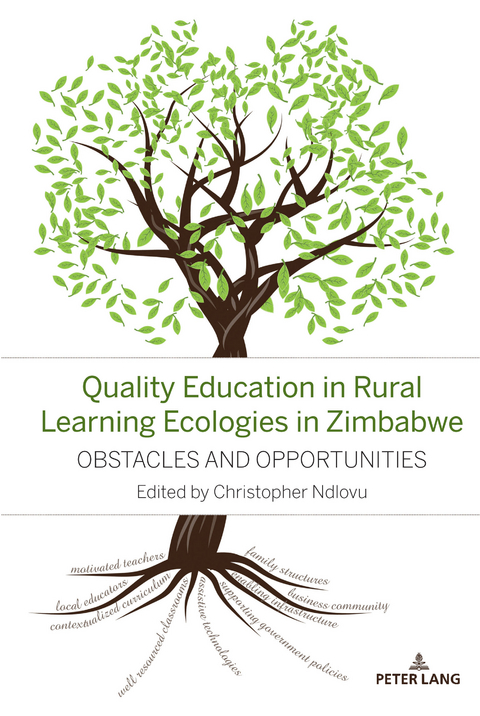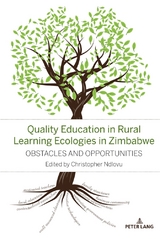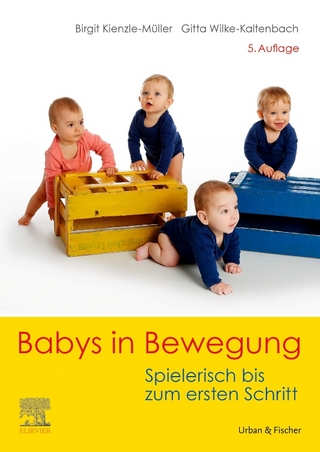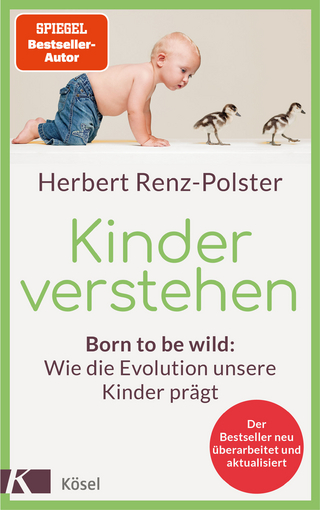Quality Education in Rural Learning Ecologies in Zimbabwe
Peter Lang Publishing Inc (Verlag)
978-1-4331-9826-7 (ISBN)
"This book brings together important views on improving learning in rural ecologies. The arguments brought forward can lead to responsive policies that can greatly benefit rural education."
—Colwasi Mthunzi, Professor of Curriculum Innovations, Solusi University
"A book that brings so much hope for rural learners and also encourages the community and parents/guardians to play an active role in the learning of their children."
—Nosizo Shava, Senior Sociology Lecturer, Hillside Teachers College
"Well-articulated papers on the ways of reducing inequalities between rural and urban education."
—Shepherd Ndondo, Post-doc fellow in Philosophy of Education, University of Fort Hare
Christopher Ndlovu has a PhD in sociology from the University of KwaZulu-Natal in South Africa, and is currently a Senior Lecturer in the Department of Educational Foundations at Lupane State University in Zimbabwe. His research interests are indigenous knowledge systems and their integration into the formal school curriculum, and the advancement of rural education.
List of Figure – List of Tables – Preface – Acknowledgments – List of Abbreviations – Ntandoyenkosi Satamwe/Nhlanhla Mkwelie: Online learning opportunities for quality rural learning ecologies – Tinashe Pikirai/Pikirai Tecla/Christopher Ndlovu: Diaspora contribution to rural education – Siphiwo Ncube/Christopher Ndlovu: Improving the teaching and learning of agriculture through the use of viable school gardens in rural schools – Ndondo Semkeliso/Ndondo Shepherd: Home involvement and Early Childhood Development (ECD) learning: Challenges and opportunities in Zimbabwean rural ecosystem – Mkwananzi Dumisani/Cynthia Ncube: Potential of home involvement in creating learning spaces in rural areas – Judith Musengi: Attainment of Sustainable Development Goal 4 (SDG 4): Teacher perceptions, readiness and practices – Mudimba Collen: Use of ChiTonga language as a medium of instruction across the Early Childhood Development curricula in ChiTonga speaking Districts of Zimbabwe – Samkeliso Mathe/Christopher Ndlovu: Changing home environments to learning centres: An alternative pathway to improved learning outcomes in rural ecologies – Mandlenkosi Ndlovu: Quality curriculum for rural learning ecologies in Zimbabwe – Mlungisi Moyo/Mudimba Collen: Online instruction during COVID 19 pandemic: Excluding the already excluded rural learner – Nkosiiathi Sibanda/Mpumelelo Ncube: Online learning opportunities in rural learning ecologies – Ndondo Shepherd/Christopher Ndlovu/Ndondo Samkeliso: Digitalization and learning opportunities in Zimbabwean rural ecologies – Pinias Chikuvadze/Munyaradzi Chidarikire: Influence of Zimbabwean policies on rural female learners progression in advanced level science subjects – Contributors’ Biographies.
“This book brings together important views on improving learning in rural ecologies. The arguments brought forward can lead to responsive policies that can greatly benefit rural education.”
—Colwasi Mthunzi, Professor of Curriculum Innovations, Solusi University
“A book that brings so much hope for rural learners and also encourages the community and parents/guardians to play an active role in the learning of their children.”
—Nosizo Shava, Senior Sociology Lecturer, Hillside Teachers College
“Well-articulated papers on the ways of reducing inequalities between rural and urban education.”
—Shepherd Ndondo, Post-doc fellow in Philosophy of Education, University of Fort Hare
| Erscheinungsdatum | 29.04.2023 |
|---|---|
| Zusatzinfo | 5 Illustrations, unspecified |
| Verlagsort | New York |
| Sprache | englisch |
| Maße | 150 x 225 mm |
| Gewicht | 368 g |
| Themenwelt | Sachbuch/Ratgeber ► Gesundheit / Leben / Psychologie ► Familie / Erziehung |
| Schulbuch / Wörterbuch | |
| Sozialwissenschaften ► Pädagogik ► Allgemeines / Lexika | |
| Sozialwissenschaften ► Pädagogik ► Berufspädagogik | |
| Sozialwissenschaften ► Pädagogik ► Bildungstheorie | |
| Sozialwissenschaften ► Pädagogik ► Erwachsenenbildung | |
| ISBN-10 | 1-4331-9826-6 / 1433198266 |
| ISBN-13 | 978-1-4331-9826-7 / 9781433198267 |
| Zustand | Neuware |
| Informationen gemäß Produktsicherheitsverordnung (GPSR) | |
| Haben Sie eine Frage zum Produkt? |
aus dem Bereich




